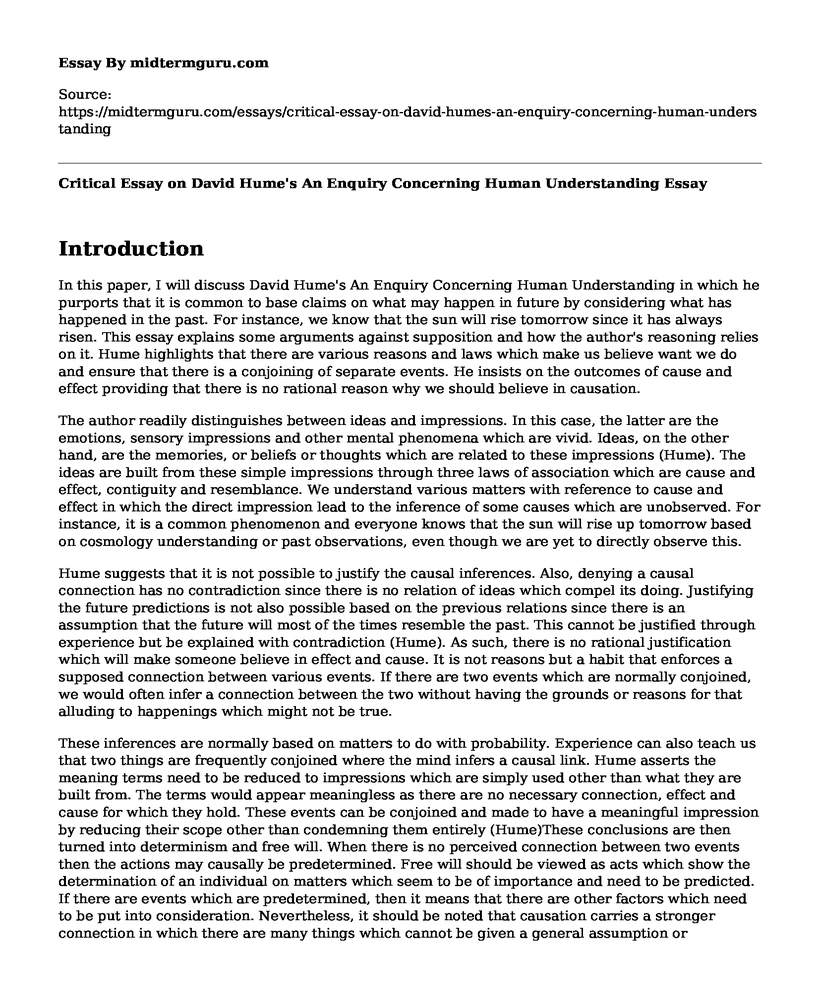Introduction
In this paper, I will discuss David Hume's An Enquiry Concerning Human Understanding in which he purports that it is common to base claims on what may happen in future by considering what has happened in the past. For instance, we know that the sun will rise tomorrow since it has always risen. This essay explains some arguments against supposition and how the author's reasoning relies on it. Hume highlights that there are various reasons and laws which make us believe want we do and ensure that there is a conjoining of separate events. He insists on the outcomes of cause and effect providing that there is no rational reason why we should believe in causation.
The author readily distinguishes between ideas and impressions. In this case, the latter are the emotions, sensory impressions and other mental phenomena which are vivid. Ideas, on the other hand, are the memories, or beliefs or thoughts which are related to these impressions (Hume). The ideas are built from these simple impressions through three laws of association which are cause and effect, contiguity and resemblance. We understand various matters with reference to cause and effect in which the direct impression lead to the inference of some causes which are unobserved. For instance, it is a common phenomenon and everyone knows that the sun will rise up tomorrow based on cosmology understanding or past observations, even though we are yet to directly observe this.
Hume suggests that it is not possible to justify the causal inferences. Also, denying a causal connection has no contradiction since there is no relation of ideas which compel its doing. Justifying the future predictions is not also possible based on the previous relations since there is an assumption that the future will most of the times resemble the past. This cannot be justified through experience but be explained with contradiction (Hume). As such, there is no rational justification which will make someone believe in effect and cause. It is not reasons but a habit that enforces a supposed connection between various events. If there are two events which are normally conjoined, we would often infer a connection between the two without having the grounds or reasons for that alluding to happenings which might not be true.
These inferences are normally based on matters to do with probability. Experience can also teach us that two things are frequently conjoined where the mind infers a causal link. Hume asserts the meaning terms need to be reduced to impressions which are simply used other than what they are built from. The terms would appear meaningless as there are no necessary connection, effect and cause for which they hold. These events can be conjoined and made to have a meaningful impression by reducing their scope other than condemning them entirely (Hume)These conclusions are then turned into determinism and free will. When there is no perceived connection between two events then the actions may causally be predetermined. Free will should be viewed as acts which show the determination of an individual on matters which seem to be of importance and need to be predicted. If there are events which are predetermined, then it means that there are other factors which need to be put into consideration. Nevertheless, it should be noted that causation carries a stronger connection in which there are many things which cannot be given a general assumption or conclusion. There is no connection that necessarily exists between cause and effect, and its predictive abilities in what should or should not happen in the future.
There is no any kind of rational justification which has been tied to speculative forms of metaphysical and religious philosophy. Scepticism, even though it is able to distort our judging and acting ability, can create a connection with an external world where there are beliefs and interconnectedness between the things which seem to be taking place. The good thing which comes from the instinctual belief is that it helps in helping people think properly and get used to custom help as long they restrict their way of thinking. We should be able to control speculations as nonsensical and superfluous when they seem to be getting out of hand. If Hume is actually right on supposition and that causation awareness comes as a result of experience, then it is only logical to know what this awareness consists of without having to contract most of his arguments. Generally speaking, there are no sensible arguments that can lead to a clear outcome such as happiness or truth without invoking the other parties. Here, the outcome of a situation or process is always dependent on the things which happened before or happening concurrently. While Hume compels his arguments against the rationalist position, he manages to give the logical conclusion on imperil empiricist philosophy.
Work Cited
Hume, David. Enquiry Concerning Human Understanding, An. Infomotions, Inc., 2000.
Cite this page
Critical Essay on David Hume's An Enquiry Concerning Human Understanding. (2022, Oct 24). Retrieved from https://midtermguru.com/essays/critical-essay-on-david-humes-an-enquiry-concerning-human-understanding
If you are the original author of this essay and no longer wish to have it published on the midtermguru.com website, please click below to request its removal:
- Childhood Trauma - Paper Example
- Individual Change - Paper Example
- Paper Example on OCD and OCPD Conditions
- Essay Sample on Looking-Glass Self: The Self-Concept
- Essay Sample on Cognitive Behavioral Therapy: Problem of Nail Biting
- Paper Example on Stress Reduction Techniques
- Essay Sample on Identifying and Interpreting Emotional Expressions







